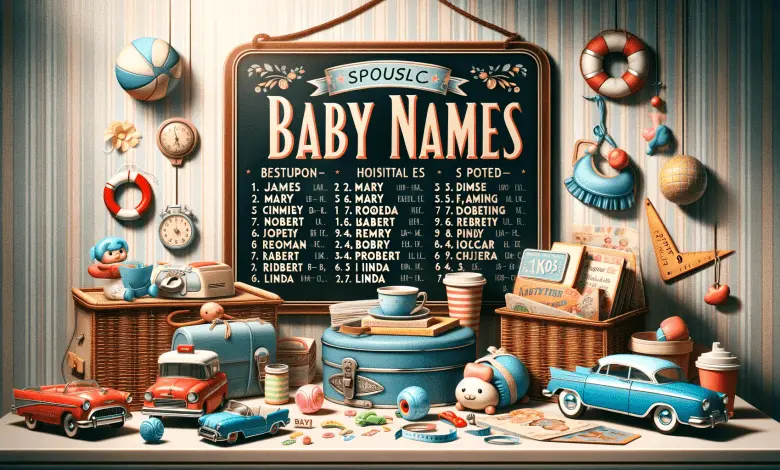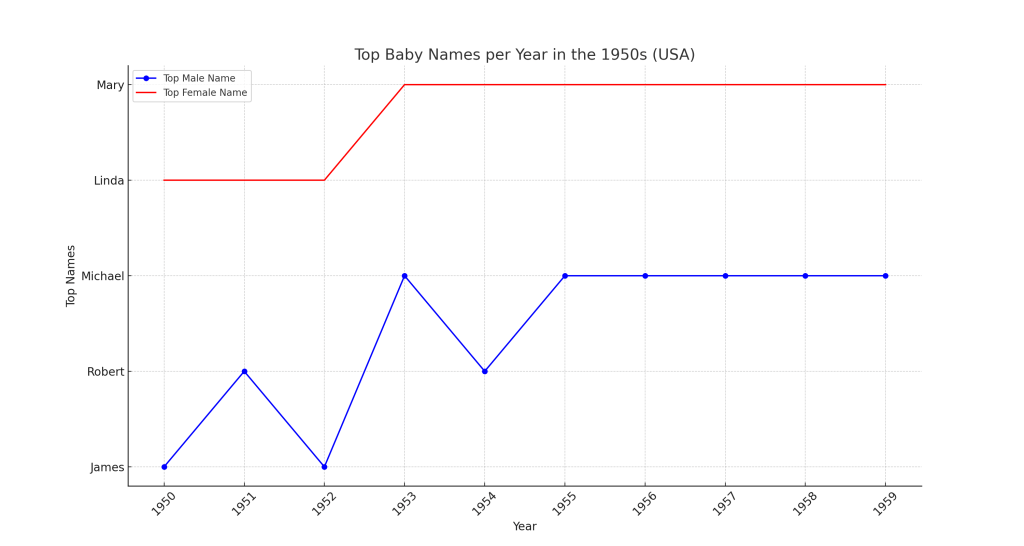50 Timeless Baby Names from the 50s: Rediscovered Gems

Baby Names from the 50s
The 1950s was a decade marked by significant cultural shifts, post-war recovery, and a sense of newfound optimism that reflected in various aspects of life, including the choice of baby names. The era’s baby names, often characterized by a blend of tradition and a nod to the simpler times, hold a unique charm and continue to captivate expectant parents and name enthusiasts alike.
These names, sourced from various lists including the Social Security Administration’s records, not only tell us about the popular trends of the time but also offer a window into the societal values and cultural landscapes of the 1950s. This article explores the most popular baby names from the 50s, delving into their meanings, origins, and the reasons behind their enduring appeal.
| Key Takeaway | Details |
|---|---|
| Enduring Popularity of Traditional Names | Names like James, Mary, and John from the 1950s demonstrate the lasting appeal of traditional and biblical names. |
| Shift Towards Modernity | Names such as Linda and Gary indicate a shift towards more contemporary choices, reflecting the social changes of the era. |
| Cultural Significance | Names often mirror societal values; for example, Richard (“brave ruler”) and Margaret (“pearl”) reflect the era’s values of strength and refinement. |
| Simplicity and Comfort | Names like Barbara and Robert were popular for their simplicity and familiar feel, offering comfort during times of change. |
| Potential for Resurgence | Vintage names like Douglas and Shirley have unique charms that make them ripe for a comeback in modern naming trends. |
| Evolution of Naming Trends | A comparison with other decades shows the 1950s as a transitional period, bridging traditional naming conventions and the diverse, unconventional choices of later decades. |
| Legacy of the 1950s Names | The baby names from the 1950s offer a rich source of inspiration today, reflecting a balance of elegance, simplicity, and historical significance. |
Popular Baby Names from the 50s
The 1950s was an era where names often reflected stability and tradition. The baby names from this decade, sourced from the Social Security Administration and other popular lists, reveal a fascinating blend of classic charm and historical significance. Let’s explore some of the most notable names from this era, along with their meanings and cultural relevance.
Top 25 Male Names:
- James – A timeless name of Hebrew origin, meaning “supplanter.”
- Michael – Of Hebrew origin, meaning “who is like God?”
- Robert – A Germanic name, meaning “bright fame.”
- John – Also of Hebrew origin, signifying “God is gracious.”
- David – Meaning “beloved,” it’s a name of Hebrew descent.
- William – A name of Germanic origin, meaning “resolute protector.”
- Richard – Of Old German origin, meaning “brave ruler.”
- Thomas – A classic name meaning “twin” in Greek.
- Mark – From Latin, meaning “consecrated to the god Mars.”
- Charles – Of Germanic origin, meaning “free man.”
- Steven – A variant of Stephen, meaning “crown” or “wreath.”
- Gary – Possibly derived from a Germanic word meaning “spear.”
- Joseph – Of Hebrew origin, meaning “Jehovah increases.”
- Donald – Scottish origin, meaning “world ruler.”
- Ronald – Similar to Donald, of Norse origin, meaning “ruler’s counselor.”
- Kenneth – Of Scottish and Irish origin, meaning “born of fire, handsome.”
- Paul – Latin origin, meaning “small” or “humble.”
- Larry – A diminutive of Lawrence, meaning “from Laurentum.”
- Daniel – Hebrew origin, meaning “God is my judge.”
- Stephen – Greek origin, signifying “crown” or “wreath.”
- Dennis – Derived from Dionysius, the Greek god of wine.
- Timothy – Of Greek origin, meaning “honoring God.”
- Edward – Meaning “wealthy guard,” of English origin.
- Jeffrey – Of Germanic origin, likely meaning “peaceful territory.”
- George – Greek origin, meaning “farmer.”
Top 25 Female Names:
- Mary – Of Hebrew origin, meaning “drop of the sea, bitter, or beloved.”
- Linda – Spanish/Portuguese for “beautiful.”
- Patricia – Latin origin, meaning “noble.”
- Barbara – Of Greek origin, meaning “foreign.”
- Susan – Hebrew origin, meaning “lily.”
- Deborah – Of Hebrew origin, meaning “bee.”
- Karen – Danish variant of Katherine, meaning “pure.”
- Nancy – Of Hebrew origin, possibly meaning “grace.”
- Donna – Italian for “lady.”
- Cynthia – Greek, referring to the goddess Artemis.
- Sandra – Short for Alessandra, meaning “defending men.”
- Sharon – Of Hebrew origin, meaning “a plain.”
- Carol – Germanic origin, meaning “free man.”
- Kathleen – Irish form of Katherine, meaning “pure.”
- Diane – Of French origin, related to the divine.
- Pamela – Invented in the 16th century, meaning “all sweetness.”
- Janet – Diminutive of Jane, meaning “God is gracious.”
- Elizabeth – Hebrew origin, meaning “God is my oath.”
- Joyce – Of Latin origin, meaning “merry, joyful.”
- Judy – A diminutive of Judith, meaning “from Judea.”
- Beverly – Old English, meaning “beaver stream.”
- Dorothy – Greek, meaning “gift of God.”
- Bonnie – Scottish, meaning “beautiful, cheerful.”
- Cheryl – French origin, possibly meaning “dear one, darling.”
- Margaret – Of Greek origin, meaning “pearl.”
Each of these names, be it male or female, carries a distinct story and a cultural background that was in vogue during the 50s. For instance, names like James and Mary, rooted deeply in biblical tradition, reflect the era’s leaning towards names with religious significance. On the other hand, names like Linda and Gary, which saw a surge in popularity during this period, indicate a shift towards more modern, yet still classical choices.
The male names from this era often embodied strength and tradition. Names like Robert, John, and William have been popular for centuries and continued to be preferred choices for boys in the 1950s. They evoke a sense of time-honored stability and respectability.
In contrast, female names from the 50s like Susan, Patricia, and Barbara were indicative of a blend of elegance and approachability. These names were often chosen for their soft, melodious sound and their classic, enduring appeal.

It’s fascinating to note how certain names, such as Kenneth and Diane, have specific meanings that might have resonated with parents during the 50s. Kenneth, meaning “born of fire, handsome,” and Diane, associated with the Roman goddess of the hunt and the moon, reflect an era’s fascination with names that had powerful, evocative meanings.
In summary, the baby names from the 50s provide a rich tapestry of cultural and historical narratives, giving us insight into the values, aspirations, and trends of the era. These names were not just identifiers but also held a mirror to the society and times they belonged to.
Themes, Trends, and Comparative Analysis of Baby Names from the 50s
Themes and Trends in 1950s Names:
The 1950s were a time of both traditionalism and the beginnings of social change, a duality reflected in the era’s baby names. Names like James, Mary, and John showcase a continued preference for biblical and classic names, symbolizing a society that valued traditional norms and stability. Meanwhile, names such as Linda and Gary hint at the beginnings of a shift towards more contemporary choices, perhaps reflecting the burgeoning modernity of the post-war era.
The names from this period also mirror the cultural and societal aspirations of the time. For instance, names like Richard (meaning “brave ruler”) and Margaret (“pearl”) may have been chosen for their connotations of strength and refinement, qualities highly regarded during the 50s. Additionally, the simplicity and familiarity of names like Barbara and Robert might have been particularly appealing to parents seeking comfort and normalcy in a rapidly changing world.
Names That Deserve a Comeback:
In today’s era of unique and sometimes unconventional baby naming, several names from the 50s are ripe for a resurgence. Names like Douglas (meaning “dark river”) and Shirley (“bright clearing”) have a vintage charm that could appeal to modern parents looking for names with a classic feel but distinct character. Similarly, names like Beverly (“beaver stream”) and Gregory (“watchful, alert”) blend a sense of history with an attractive, timeless quality.
Comparison with Other Decades:
When compared to names from the decades preceding and succeeding the 1950s, a clear evolution in naming trends emerges. Pre-1950s names often leaned more heavily towards very traditional and formal names. Post-1950s, especially in the 60s and 70s, saw an influx of more diverse and unconventional names, reflecting the societal shifts and the spirit of freedom and revolution of those times. The 1950s stand as a transitional period where the balance of traditional and modern began to shift, setting the stage for the more varied naming practices of later decades.
Conclusion:
The baby names from the 50s offer a fascinating glimpse into a pivotal decade that balanced between traditional values and the cusp of modern transformation. These names, with their blend of elegance, simplicity, and depth of meaning, not only reflect the ethos of the 1950s but also continue to resonate in today’s world. Whether seeking a name steeped in tradition or looking for something with a timeless ring, the baby names from the 50s provide a rich source of inspiration, echoing a bygone era’s charm and its enduring legacy in the annals of naming history.





